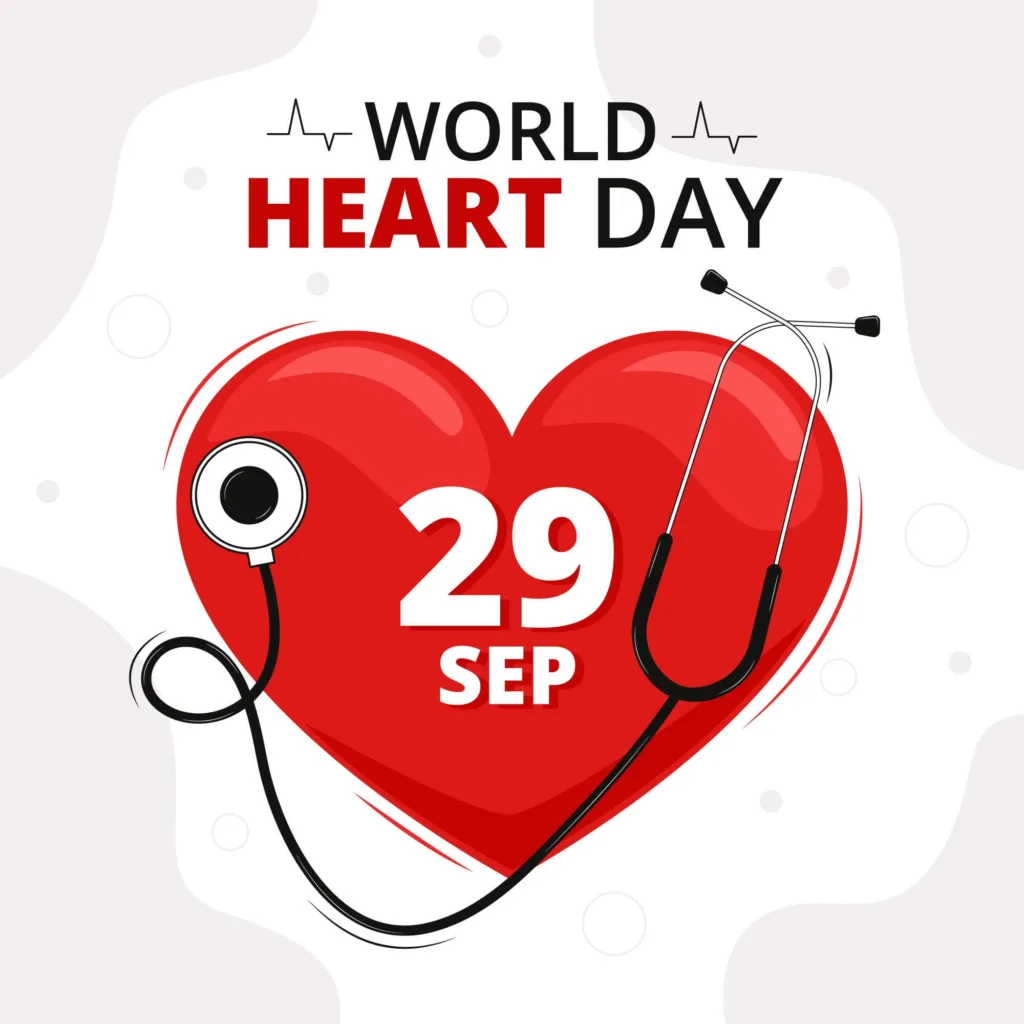
On every 29th September the entire world observes it as World Heart Day. It aims to promote awareness about the health of the heart and other cardiovascular issues. Additionally, it promotes international cooperation for the benefit of every person. Never before has this day been more significant than it is now, in 2023. The ongoing global health challenges, including the COVID-19 pandemic, have underscored the importance of maintaining a healthy heart. This year, as we celebrate World Heart Day, we reflect on the key issues surrounding cardiovascular health and the steps we can take to ensure a healthier heart for ourselves and future generations.
The State of Cardiovascular Health
Heart disease has occupied the top place among the other life-threatening diseases. If we go through the data, we will observe that approximately 17.9 million individuals die from cardiac issues globally each year. The heart diseases have gone past the barrier of age and financial status. I am just trying to emphasize that all individuals are prone to the heart diseases due to the present lifestyle. Furthermore, the pandemic has made things worse by raising reports of heart-related problems in COVID-19 patients.
World Heart Day: The Risk Factors
Knowing what might harm our hearts is crucial for maintaining global heart health. Some of the reasons that leads to various heart ailments are as follows:
- Unhealthy diets: Consuming foods that are having very high amount of fats, salt and sugar in excess. Because it can lead to high blood pressure and rise in cholesterol level.
- Lack of exercise: Not being active and sitting a lot can be a big problem. Moving around helps us stay at a good weight, keeps our blood pressure normal, and makes our hearts strong.
- Smoking: Smoking is a big reason why people have heart issues. It damages the blood arteries and slows down the blood flow. It results in the blood clots too often.
- Drinking Too Much Alcohol: Consumption of alcohol increases the blood pressure and makes the individual more prone to the heart issues.
- Stress: Being overly anxious can lead to actions that are bad for our hearts, such as overeating or smoking.
- Family History: If someone in our family has experienced cardiac issues, we may be more likely to as well.
- Getting Older: As we get older, the chance of having heart problems goes up. For men, it starts going up after 45, and for women, it’s after 55.
World Heart Day: Taking Action
This year’s World Heart Day theme is “Unite for Heart Health.” It tells us that working together is very important to fight heart problems and make our hearts healthier everywhere. We need to follow these steps to have a healthy heart:
- Healthy Diet: One must always be focused on to take healthy meal. It must include fruits, vegetables, whole grains, lean meats and healthy fats. We must keep ourselves away from the processed foods excessive sweets and salts.
- Stay Active: Staying active means to perform regular exercise apart from our professional work. Try to exercise to such an extent that is neither too less nor too excessive for your body to handle. Recently, there have been number of incidences where the individuals have faced heart attacks while doing gym.
- Stop Smoking: Smoking is something where an individual not only harms himself or herself but also harms the nearby people. Moreover, they add to the pollution and harm the environment. Apart from heart, lungs are also severely affected by smoking.
- Say no to alcohol: Avoid drinking too much alcohol if you do. Here also there is threat to multiples organs along with heart.
- See the Doctor: Go to the doctor regularly to check your blood pressure, cholesterol, and overall heart health. It helps catch problems early, and that’s important.
- Educate and Advocate: Spread awareness about heart health in your community. Encourage others to adopt heart-healthy lifestyles and advocate for policies that promote cardiovascular health.
Yogas for healthy Heart
Yoga can improve heart health by encouraging calm, lowering stress, enhancing general fitness, and improving flexibility. Although yoga by itself might not be a replacement for other cardiovascular exercises, it can support a heart-healthy lifestyle. The following yoga poses are very beneficial for heart health:

- Pranayama (Breathing Exercises): Controlled breathing techniques can help decrease blood pressure and reduce stress. These exercises encourage relaxation and might be especially beneficial for people with high blood pressure.
- Asanas (Yoga Poses):
- Surya Namaskar (Sun Salutation): This sequence of yoga poses helps improve cardiovascular fitness and flexibility. It involves a series of forward and backward bending poses along with controlled breathing.
- Trikonasana (Triangle Pose): This pose stretches the chest and helps improve lung capacity.
- Bhujangasana (Cobra Pose): Cobra pose strengthens the chest muscles and can improve posture, which is important for heart health.
- Matsyasana (Fish Pose): Fish pose opens up the chest and improves lung function.
- Setu Bandhasana (Bridge Pose): This pose strengthens the back and opens up the chest, improving circulation.
- Meditation and Mindfulness: Yoga frequently includes mindfulness and meditation techniques, which can help lower stress and improve mental health. Since persistent stress can worsen heart disease, stress reduction is essential for heart health.
- Yoga Nidra (Yogic Sleep): This guided meditation and relaxation technique aids in stress reduction and better sleep, both of which are crucial for preserving a healthy heart.
- Anulom Vilom (Alternate Nostril Breathing): This pranayama technique helps balance the autonomic nervous system, reducing stress and promoting relaxation.
- Ardha Matsyendrasana (Sitting Half Spinal Twist): This pose helps improve digestion and can indirectly support heart health by promoting overall well-being.
Yoga can be a beneficial component of a heart-healthy lifestyle, but it shouldn’t take the place of any medical care or drugs recommended by a doctor for treating heart issues. Before beginning a new workout or yoga regimen, those with pre-existing cardiac conditions should speak with a healthcare expert to make sure it is secure and suitable for their unique situation. Heart health also heavily depends on eating a balanced diet, exercising frequently, and according to physician recommendations.
The Role of Technology
Technology is doing a lot to assist us in taking care of our hearts in today’s high-tech society. There are devices like fitness trackers and phone applications that monitor our heart rates, movement, and even sleep quality. We can get vital information about our general health from these technologies.
Telemedicine (speaking with a doctor via video chats) and remote monitoring (keeping track of your health from a distance) have grown significantly in importance when it’s difficult to visit a doctor in person. They are quite beneficial, especially for those who have cardiac issues, and have been extremely helpful throughout the epidemic.
What’s even cooler is that super-smart computers, like ones that use artificial intelligence and machine learning, are helping doctors look at tons of medical info. They can spot early signs of heart issues and come up with treatment plans that are just right for each person. This new way of doing things has the potential to make heart care even better and more precise.
World Heart Day: The Global Initiatives
World Heart Day is not just about individual action but also about fostering global initiatives and partnerships. Various organizations, including the World Heart Federation, collaborate to raise awareness, share knowledge, and advocate for policies that promote heart health. These efforts include:
- Policy Advocacy: Promoting laws that encourage the availability of better food alternatives, the banning of cigarettes, and increased access to healthcare.
- Community outreach: Engaging with communities to disseminate information and materials on heart health, especially in underprivileged regions.
- Research and Innovation: Supporting and carrying out studies to better comprehend cardiac conditions and create cutting-edge remedies and preventative measures.
- Education efforts: Starting efforts to educate the populace on the value of heart health and ways to lower risk factors.
Conclusion
The year 2023’s World Heart Day serves as a timely reminder that our hearts are valuable and that we should safeguard them by being proactive. We can significantly reduce the burden of cardiovascular illnesses worldwide by adopting heart-healthy behaviors, increasing awareness, and supporting international programs. To guarantee that everyone has a healthier and better future, let’s stand together for heart health every day, not only on September 29.
